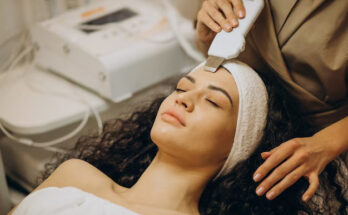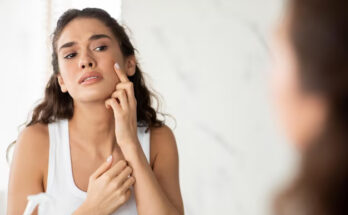Learn how simple it is.
You understand how important it is to control your Skincare natural moisture if you have oily, acne-prone skin. By the afternoon, does your skin appear shiny? I have, indeed. slipping makeup on your oily face? Oh, yes. Your skin-care regimen and products play a major part in how well you take care of your oily skin. The Beauty Society has been researching the top creams, cleansers, scrubs, and even beauty tools for oily skin types for many years. Please allow me to guide you as you learn the greatest dos and don’ts for oily skin.
Causes Of Oily Skin
Sebaceous glands on our skin create sebum, or natural oils, to hydrate it and safeguard its lipid barrier. But excessive sebum produced by oily skin causes glossy skin, greasiness, enlarged and clogged pores, acne, blackheads, and outbreaks.
Sebocytes (cells that produce sebum) may be affected by hormones like testosterone and oestrogen, which could enhance their activity and cause acne.
7 Essentials For Oily Skin
Vitamin A
Retinol is one of the first substances that spring to mind when we talk about skin care. Ingredient number two:
- Reduces the appearance of pores;
- Repairs photodamage;
- Aids in the prevention of acne
Additionally, it lessens hyperpigmentation and minimises fine lines and wrinkles.
If it is used in your morning routine, strict sun protection must be observed. Because retinol can make you more photosensitive, use sunscreen during the day to protect yourself from sun damage.
Salicylic Acid
For oily skin, salicylic acid is an important necessity. This keratolytici substance breaks down the skin’s cellular connections, facilitating natural exfoliation and aiding in the maintenance of clear pores. Get cleansers with salicylic acid at 2% (highest strength) so you can wash your face twice daily.
Hydroxyproline
You are mistaken if you believe that oily skin does not require moisturising. Your Skincare may produce extra sebum to make up for the moisture loss if there is a lack of moisture. Hyaluronic acid is hydrating, lightweight, and mild. It also greatly aids in sebum management.
Hyaluronic acid’s sodium salt is what quickly penetrates the skin and offers superior moisturization.
Niacinamide
This cosmeceuticali is utterly beloved by skin care devotees. The following advantages of niacinamide, commonly known as nicotinamide, as a powerful antioxidant.
According to a study done on Caucasian and Japanese people, consuming 2% niacinamide lowers sebum levels on the skin. When utilised, niacinamide (vitamin B3) accomplishes the following tasks.
- Stabilises the skin’s barrier
- Quickens the rate of skin cell replacement
- Lessens hyperpigmentation
- Improves the suppleness of the Skincare
- Decreases excessive sebum production and pore size on the skin
Beta-Arbutin
This Skincare lightening product decreases melanin concentration, inhibits tyrosinase activity (an enzyme that promotes melanin synthesis), and aids in the treatment of blemishes. But always keep in mind that you should always treat your acne before your acne marks.
Clay
Mineral-rich clays can help you get rid of extra sebum if you choose natural solutions. Fuller’s earth, rhassoul clay, bentonite clay, and other types of clay help exfoliate skin care routine for oily skin cells, which lowers sebum production . To avoid too much drying out, use a moisturiser after.
Beta Hydroxy Acids
Peels are perfect for oily skin. Glycolic, lactic, and mandelic acids are examples of alpha hydroxy acids that are frequently used to treat acne, scars, melasma, hyperpigmentation, age spots, and rough skin.
While there are treatments available in clinics, you may also get OTC face peels in a variety of strengths. These peels can lighten pores and smooth out the texture of your skin. However, it is preferable to start with the lowest concentration and give your skin time to adjust if you have never used AHA-BHA peels previously.
To hydrate your skin and reduce acne, you can also search for products that contain tea tree oil, ceramides, and peptides.
Avoid These Constituents If You Have Oily Skincare
Products made with high-fat vegetable oils, such as:
- coconut oil,
- sunflower oil,
- camellia oil,
- hazelnut oil
Ingredients that prevent visibility, such as
- beeswax,
- lanolin,
- paraffin
It’s time to establish a daily skin care programme after gathering your goods. Everybody has a standard cleansing-toning-moisturizing (CTM) regimen. To give your skin more nourishment, you can increase the basic routine by a few steps.
Skincare Dull For Oily Skin In The Morning
Step 1: Exfoliate.
Only perform this action once each week. To remove the dead skin cells and smooth the texture, apply a physical or chemical exfoliant.
Step 2: Tone
Don’t skip this procedure. Additionally, it removes any residue that was left on the face after cleansing.
Step 3: Applying moisture
Use water-based gel moisturisers on oily skin to trap in moisture, keep your skin hydrated, and stop excessive sebum production.
Step 4: Night cream
To assist in reestablishing the skin barrier, hydrate the skin with a nutritious night cream. You can also use a sleeping mask to keep your skin moisturised while you sleep all night long.
Step 5: Eye cream
Apply eye cream to the delicate area around the eyes to prevent dark circles and nourish the skin as a last step. These creams can be found as under-eye creams.
Guidelines for Caring for Oily Skincare
Here are a few oily skin care suggestions to keep in mind in addition to your normal skincare regimen.
- Do make use of skincare and makeup that are appropriate for your skin type.
- Use toners without alcohol or cosmetics based on petroleum.
- Maintain regular brush cleanings.
- Avoid exfoliating your face too hard.
- Do frequent exercise to enhance blood circulation.
- Blotting paper should be used to remove extra oil.
- Avoid skipping the post-workout cleanse.
- As touching your face might spread dirt and pollutants, refrain from doing so.
Main Points
The overproduction of sebum in oily skin can result in outbreaks, greasiness, and acne.
Retinol, salicylic acid, and hyaluronic acid-containing skin care treatments may reduce the oiliness.
Useless items that contain beeswax or coconut oil should be avoided.
To manage oily skin, keep blotting papers close at hand, use makeup designed for oily Skincare, and refrain from often touching your face.
If you belong to the oily skin family, these are just a few basic guidelines to follow, so let Beauty Society guide you! Applying the right cleansers, moisturisers, and masks help prevent breakouts and excess oil production due to oily skin.



